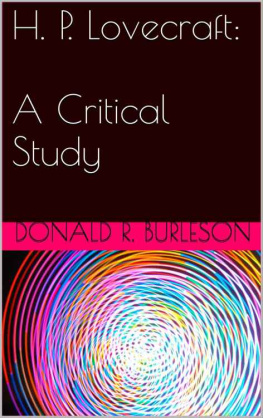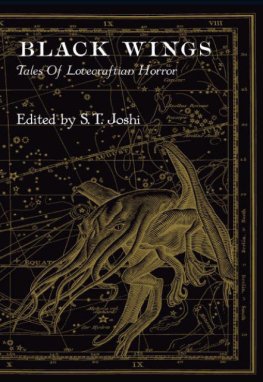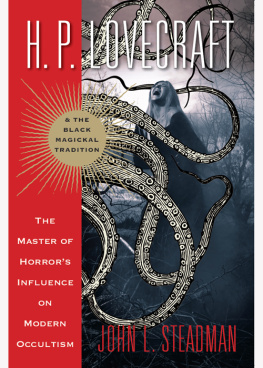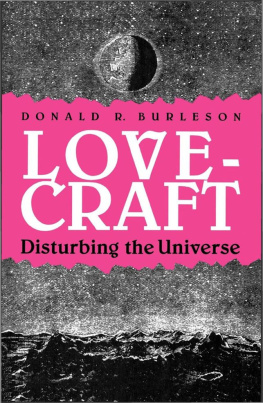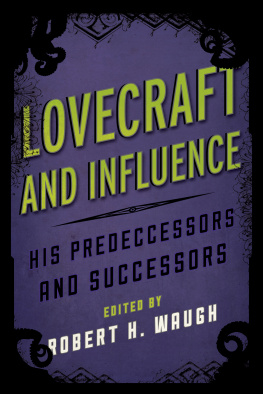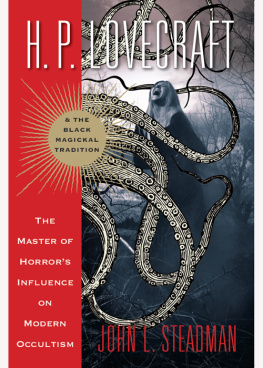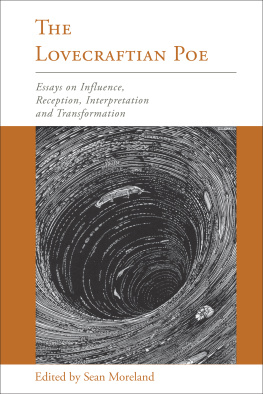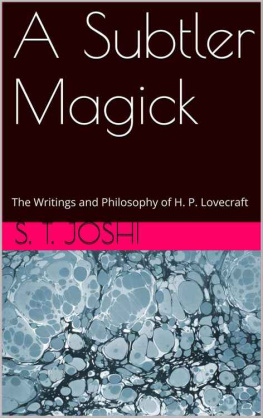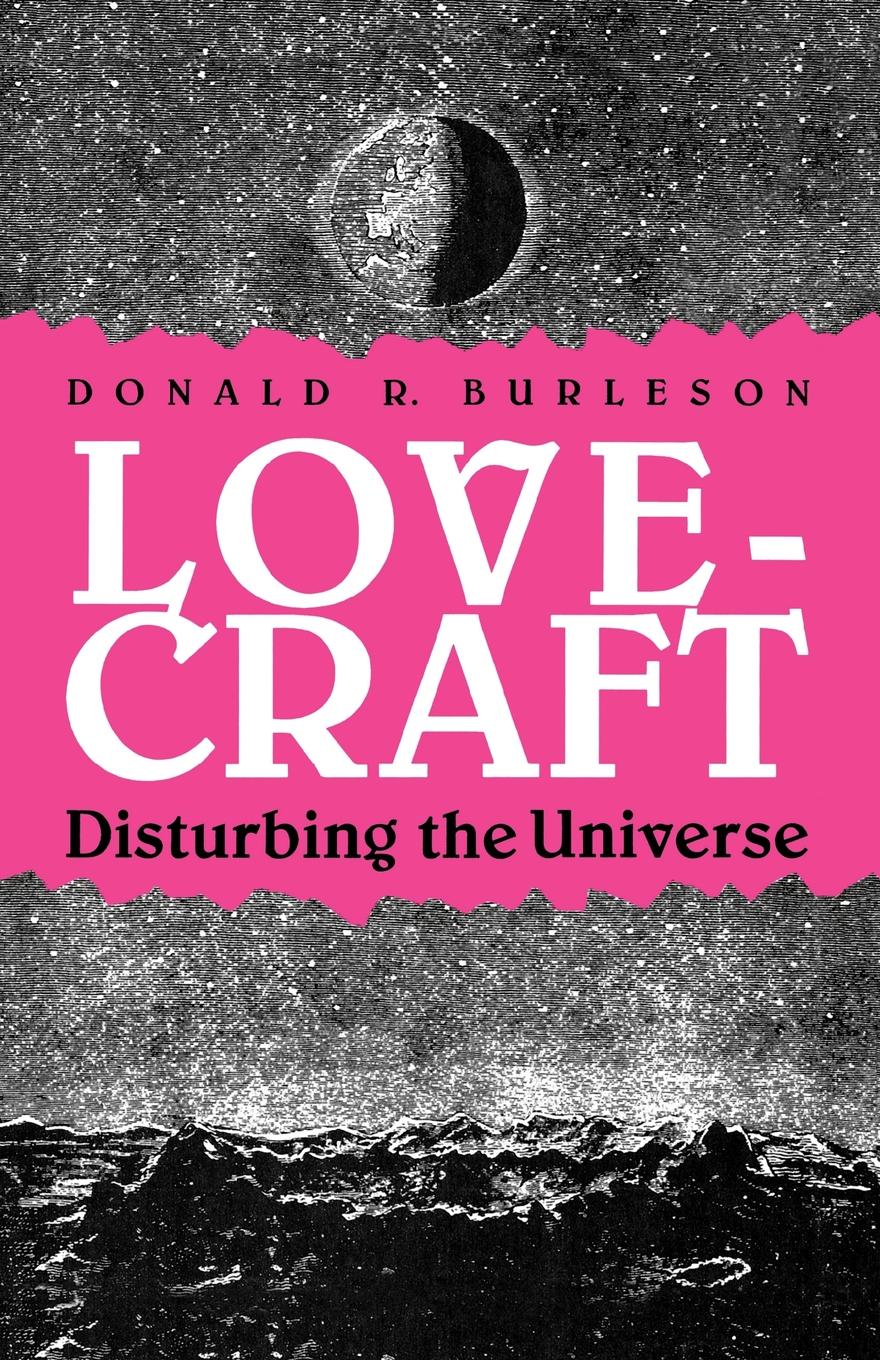LOVECRAFT
LOVECRAFT
Disturbing the Universe
DONALD R. BURLESON

Copyright 1990 by The University Press of Kentucky
Paperback edition 2009
The University Press of Kentucky
Scholarly publisher for the Commonwealth, serving Bellarmine University, Berea College, Centre College of Kentucky, Eastern Kentucky University, The Filson Historical Society, Georgetown College, Kentucky Historical Society, Kentucky State University, Morehead State University, Murray State University, Northern Kentucky University, Transylvania University, University of Kentucky, University of Louisville, and Western Kentucky University.
All rights reserved.
Editorial and Sales Offices: The University Press of Kentucky
663 South Limestone Street, Lexington, Kentucky 40508-4008
www.kentuckypress.com
Cataloging-in-Publication Data is available from the Library of Congress.
ISBN 978-0-8131-9319-9 (pbk: acid-free paper)
This book is printed on acid-free recycled paper meeting the requirements of the American National Standard for Permanence in Paper for Printed Library Materials.

Manufactured in the United States of America.

| Member of the Association of
American University Presses |
Contents
Il dit toujours autre chose, cela et autre chose, autre chose que ce quil dit, une chose plus lautre, toujours autre chose. Il dit une chose comme lautre.
Jacques Derrida,
Signponge
What wonders unexpected may exist
In those far provinces of web and mist!
H.P. Lovecraft,
Tryouts Lament for the Vanished Spider
Und wenn du lange in einem Abgrund blickst, blickt der Abgrund auch in dich hinein.
Friedrich Nietzsche,
Jenseits von Gut und Bse
Do I dare
Disturb the universe?
T.S. Eliot,
The Love Song of J. Alfred Prufrock
For S.T. Joshi
Preface
During the 1970s and 1980s, a notable amount of literary criticism began to appear on the Providence, Rhode Island, writer H.P. Lovecraft (1890-1937). Most of it belongs to such schools as formalist, Jungian-psychoanalytic, and mythic criticism. Though the present study is from a very different critical perspectivethat of post-structuralist or deconstructive readingthe purpose is not to minimize the results of previous criticism. Formalism, for example, provides insights that are scarcely to be ignored. Rather, the purpose here is to look farther afield with the texts, to submit them to particular kinds of close readings that extend previous conceptions of their literary depth and show how enigmatic, as creatures of language, the texts really are. No one until now has applied the strategies of post-structuralist thinking to Lovecrafts writings, and I believe that those writings will loom all the more significant as these strategies are brought to bear on them. With the late Paul de Man, I believe that literary texts are literary precisely to the degree that their figurality encourages the protean encroachments of deconstructive reading. My particular point of view concerning post-structuralist theory and critical technique, together with a general discussion of the nature of deconstruction for those readers not intimately acquainted with the subject, is described in .
When choosing which Lovecraft texts to explore here, I felt much like a small child visiting an ice cream parlor that offers several dozen flavors. One is tempted to pig out and eat them allmuch as Lovecraft, in the company of friends, once literally did in an ice cream parlor in downstate Rhode Island. But such indulgence would have the usual inflating effects, alas. Deconstruction is an open-ended, generative process, capable of producing considerable commentary on any particular text, and one must practice a certain reluctant economy. Short of resigning to the inevitability of corpulence, one cannot try all the flavors. In particular, I have resisted the temptation to take on Lovecrafts novels here; even The Case of Charles Dexter Ward alone, with its wealth of raw materials, would require a volume the size of this one to do it justice. For similar reasons, I decided to omit the novella The Shadow Out of Time. Lovecrafts longer work is represented, however, with a discussion of the novella The Shadow over Innsmouth. Though there is a certain general valuational aspect to choosing texts, my selection here of thirteen storiesa post-structuralist bakers dozen, a coven of storiesdoes not imply that pieces not chosen deserve to be neglected. Certainly some of the tales not selected here have a great deal to commend them and could themselves be deconstructed to good effect. My choices, not arbitrary but not possible to defend to every readers liking either, simply reflect a realistic assessment of how much it is possible to include and a feeling that certain texts would be uncommonly interesting to work with. A few of the stories chosen have long been considered major Lovecraft pieces from more traditional viewpoints (e.g., The Colour Out of Space and The Dunwich Horror), while a few of the others are stories perhaps less often read, though this consideration alone does not necessarily account for their inclusion or exclusion.
Even with the texts selected, I have practiced of necessity a certain economy. Deconstruction never really ends, never exhausts all possibilitiesyet functioning between the covers of a book, one must in fact stop somewhere, at a point at which one feels that a gratifying amount of insight into the open mystery of the texts has emerged.
Even after having read and reread Lovecraft for thirty-five years, I have found the texts newly productive of mystery and wonder upon deconstructive reading. I invite the reader to share the experience.
I would like to thank Arkham House for kindly granting permission to quote from the works of H.P. Lovecraft.
For his help, inspiration, and friendship over the years that I have known him, I would like to thank Lovecraft scholar S.T. Joshi, to whom this volume is dedicated.
Finally, but especially, I extend loving thanks to my wonderful wife, Mollie (a serious Lovecraftian in her own right), for whom, during the trying times of the writing of this book, the post-structuralist notion of absence has, I fear, taken on special meaning.
The Lovecraft stories treated here are found in the three major collections of revised texts published by Arkham House (see Bibliography), and citations in the text will refer to these sources with the following abbreviations:
ATM | At the Mountains of Madness and Other Novels |
DAG | Dagon and Other Macabre Tales |
DUN | The Dunwich Horror and Others |
In each chapter deconstructing a particular story, the appropriate designation will be given once for the source of the text, and further references to the same text will simply provide page numbers.
I should also mention here that all Indo-European roots and other etymological data have been taken from the American Heritage Dictionary of the English Language


